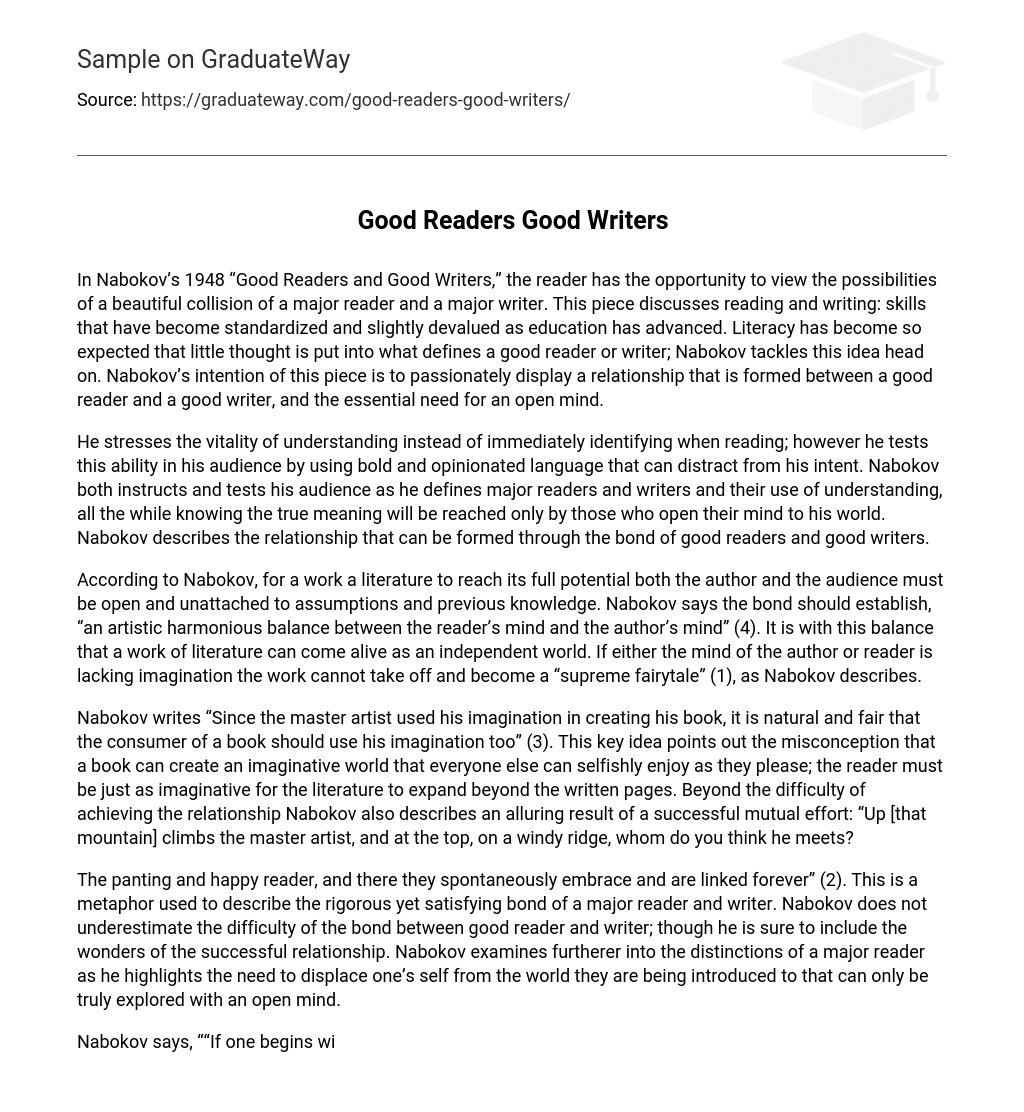In his 1948 essay “Good Readers and Good Writers,” Nabokov explores the potential harmonious connection between skilled readers and skilled writers. The essay examines reading and writing, which have lost some value and become standardized due to advancements in education. Literacy is now taken for granted, and little consideration is given to the qualities of a good reader or writer. However, Nabokov directly confronts this notion. His aim is to passionately illustrate the bond that forms between a proficient reader and a talented writer, emphasizing the crucial importance of having an open mind.
Nabokov emphasizes the importance of comprehension over immediate recognition while reading. Nevertheless, he challenges his audience by employing bold and opinionated language that may divert their attention from his intended message. Nabokov simultaneously educates and assesses his audience as he delineates the characteristics of accomplished readers and writers and their reliance on comprehension. Ultimately, he recognizes that only those who are receptive to his world will truly grasp its significance. Nabokov elucidates the connection that can be established through the alliance of adept readers and skilled writers.
According to Nabokov, for a piece of literature to reach its full potential, the author and audience must approach it without assumptions or previous knowledge. There should be a connection between the reader’s mind and the author’s mind, creating an artistic and harmonious balance. This balance allows the work of literature to come alive as a separate and independent world. If either the author or reader lacks imagination, the work will not become the supreme fairytale envisioned by Nabokov.
According to Nabokov, the artist’s use of imagination in creating a book necessitates that the reader also utilizes their imagination when engaging with the text. This challenges the misconception that a book can effortlessly transport readers into an imaginative world for their own enjoyment. In order for the literature to transcend the written pages, the reader must actively contribute their imagination. Additionally, Nabokov highlights that developing this mutual imaginative relationship is not easy. However, he tantalizingly suggests that the end result of this successful collaboration is encountering someone unexpected atop a windy ridge.
The panting and happy reader and the writer are metaphorically embraced and forever connected in their rigorous yet satisfying bond (2). Nabokov acknowledges the challenges of this bond between a good reader and writer but also celebrates its wonders. He delves deeper into the characteristics of a major reader, emphasizing the importance of approaching a new world with an open mind for a genuine exploration.
According to Nabokov, starting with preconceived notions hinders understanding of a book (1). Nabokov emphasizes the importance of approaching literature with an open mind in order to comprehend its message. Seeing only what one already knows prevents the discovery of new perspectives and worlds. Misinterpreting Nabokov’s work may lead to the misconception that he believes good writing should be accepted solely based on its quality, which is not the case.
Nabokov emphasizes that readers should open their minds to understanding another world, rather than automatically agreeing or accepting it. The decision to agree or disagree should only be made after fully comprehending the content. According to Nabokov, the material in this world may have some reality, but it doesn’t exist as a complete accepted entity. He believes that readers can always find something minor to grasp onto in order to perceive only what aligns with their own thoughts, feelings, and knowledge. As long as the reader refuses to look beyond their own limitations, they will never see the author’s material as a whole.
Instead of simply comparing the new world to worlds we already know, Nabokov urges readers to closely study it and approach it as something completely separate. By doing so, readers can fully understand the new world and then compare its connections to other worlds and knowledge. Nabokov boldly emphasizes his thoughts and only speaks to those willing to listen. His lesson requires the audience to look beyond personal comparison and preference.
The text emphasizes the importance of understanding and appreciating Nabokov’s ideas before applying them to the world of reading and writing. Despite his refusal to soften his thoughts, Nabokov conveys a distinct message with sentences and phrases that carry a condescending tone. Additionally, he employs superlatives like “the best temperament for a reader to have…” to emphasize certain points.
The use of opinionated statements like “nothing is more boring or more unfair…” (1) can prevent the audience from being open-minded as they provoke emotions. Nabokov intentionally challenges his audience by employing powerful language and phrases that can easily captivate many individuals. Although he strongly emphasizes the impact of personal knowledge on understanding, his readers tend to apply his words to themselves, forming judgments and agreements without fully embracing the ideas he presents.
Nabokov argues that one cannot fully assess, endorse, comprehend, or reject content without immersing it in an impartial mind and assimilating it into one’s thoughts. According to the author, establishing comprehension before establishing connections and relationships is a crucial aspect of the bond shared by proficient readers and skilled writers. Although Nabokov’s words and imagery emphatically convey his message, his intentions can easily be misconstrued by his audience. By compelling his audience to transcend their own perspectives and realities, Nabokov demonstrates his message and conveys a genuine understanding of his purpose.
Nabokov acknowledges that some readers may misinterpret his powerful language and fail to comprehend its meaning. In his essay “Good Readers and Good Writers,” Nabokov challenges his audience while also providing them with the necessary tools. To fully benefit from this piece, one must embrace the understanding that Nabokov imparts. Despite the fact that his testing language may sometimes overshadow the pure intention of open-mindedness, Nabokov highlights the significant connection between avid readers and skilled writers, emphasizing how they collectively generate new realms that broaden one’s personal knowledge.





